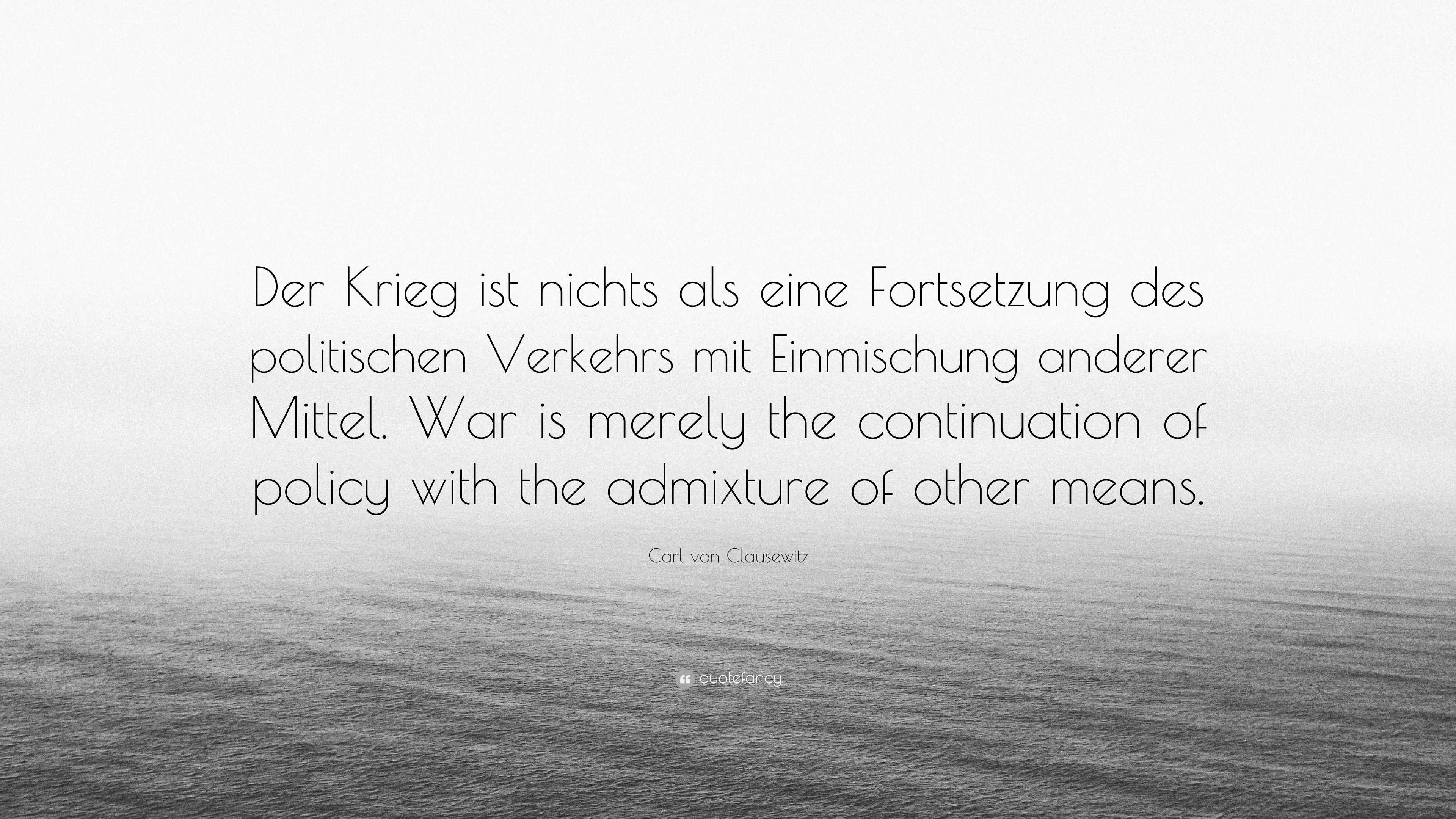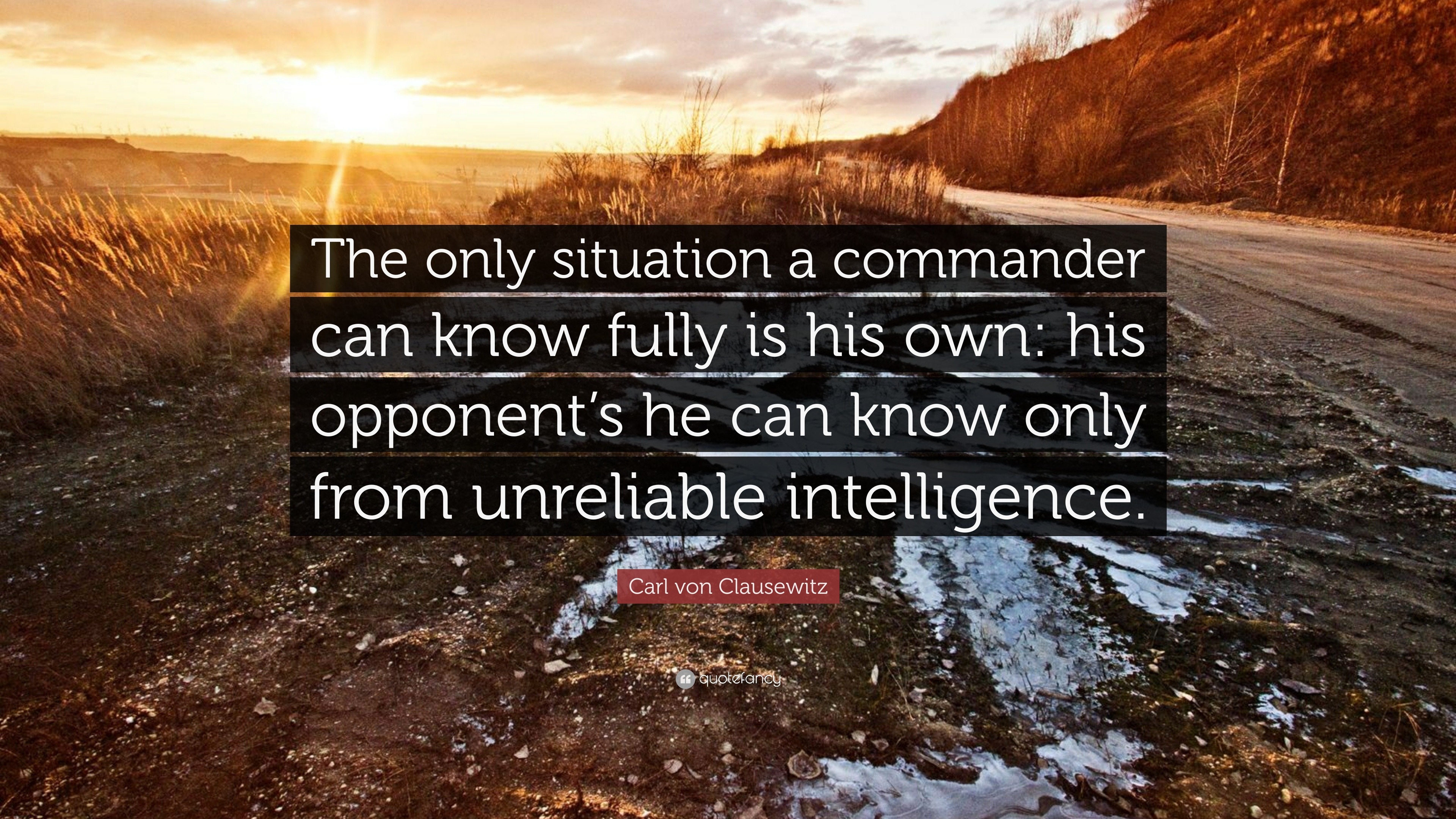
Carl von Clausewitz Quote “Talent and genius operate outside the rules, and theory conflicts
Listed below are quotations about victory from the famous Prussian General, Clausewitz. 55."Courage, above all things, is the first quality of a warrior." -Carl von Clausewitz. 56."Although our intellect always longs for clarity and certainty, our nature often finds uncertainty fascinating." -Carl von Clausewitz.

Carl von Clausewitz Quote “War should never be thought of as something autonomous, but always
Carl von Clausewitz. It should be noted that the seeds of wisdom that are to bear fruit in the intellect are sown less by critical studies and learned monographs than by insights, broad impressions, and flashes of intuition. Carl von Clausewitz. The more physical the activity, the less the difficulties will be.

Carl von Clausewitz Quote “Der Krieg ist nichts als eine Fortsetzung des politischen Verkehrs
Carl von Clausewitz, (born June 1, 1780, Burg, near Magdeburg, Prussia—died Nov. 16, 1831, Breslau, Silesia), Prussian general and author. Born to a poor middle-class professional family, he joined the Prussian army at age 12 and entered the War College in Berlin in 1801. After serving with distinction in the Napoleonic Wars, he became a.

Carl von Clausewitz Quote “Knowing is different from doing and therefore theory must never be
„Die politische Absicht ist der Zweck, der Krieg ist das Mittel, und niemals kann das Mittel ohne Zweck gedacht werden." — Carl von Clausewitz, buch Vom Kriege Vom Kriege, 1. Buch, 1. Kapitel, Unterkapitel 24

Carl von Clausewitz Je mehr ein General von seinen Truppen zu fordern gewohnt ist, desto besser
― Carl Von Clausewitz, On War. tags: clausewitz, strategy, war. 8 likes. Like "The political object is the goal, war is the means of reaching it, and means can never be considered in isolation from their purpose" ― Carl von Clausewitz, On War. 7 likes. Like "For political and social as well as for military reasons the preferred way of.

Carl von Clausewitz Quote “The only situation a commander can know fully is his own his
Carl von Clausewitz. War is very simple, but in War the simplest things become very difficult. Carl von Clausewitz ( 1 June 1780 - 16 November 1831) was a Prussian general and influential military theorist. He is most famous for his military treatise Vom Kriege, translated into English as On War .

Carl von Clausewitz Quote “The only situation a commander can know fully is his own his
104 quotes from Carl von Clausewitz: 'The enemy of a good plan is the dream of a perfect plan.', 'If the mind is to emerge unscathed from this relentless struggle with the unforeseen, two qualities are indispensable: first, an intellect that, even in the darkest hour, retains some glimmerings of the inner light which leads to truth; and second,.

Carl von Clausewitz Quote “War is an act of force, and to the application of that force there
He was 26. Clausewitz was held prisoner with his prince in France from 1807 to 1808. Returning to Prussia, he assisted in the reform of the Prussian army and state. [7] Johann Gottlieb Fichte wrote On Machiavelli, as an Author, and Passages from His Writings in June 1807.

Genial Zitate Von Clausewitz
Hier finden Sie 38 Zitate und Gedichte von Carl von Clausewitz. In einer der größten deutschsprachigen Gedichte- und Aphorismensammlungen.

Carl von Clausewitz Quote “The only situation a commander can know fully is his own his
125 Copy quote Tactics is the art of using troops in battle; strategy is the art of using battles to win the war Carl von Clausewitz Art, War, Winning 97 Copy quote The world has a way of undermining complex plans. This is particularly true in fast moving environments.
Carl Philipp Gottfried von Clausewitz zitate.eu
Carl von Clausewitz, a Prussian military officer and military theorist, revolutionized the understanding of warfare and strategy with his seminal work, "On War." Considered one of the greatest military thinkers of all time, Clausewitz's ideas continue to shape military thought and strategic planning to this day. His central concept of war as an extension of […]

Carl von Clausewitz Quote “Knowing is different from doing and therefore theory must never be
"If the mind is to emerge unscathed from this relentless struggle with the unforeseen, two qualities are indispensable: first, an intellect that, even in the darkest hour, retains some glimmerings of the inner light which leads to truth; and second, the courage to follow this faint light wherever it may lead."

Carl von Clausewitz. Die besten Zitate, Lebensweisheiten, Sinn Sprüche und Aphorismen YouTube
Carl von Clausewitz (born June 1, 1780, Burg, near Magdeburg, Prussia [Germany]—died Nov. 16, 1831, Breslau, Silesia [now Wrocław, Pol.]) Prussian general and military thinker, whose work Vom Kriege (1832; On War) has become one of the most respected classics on military strategy. Early military career

Carl von Clausewitz Quote “Only the element of chance is needed to make war a gamble, and that
Introduction. The Prussian-German soldier and military philosopher Carl Philipp Gottlieb von Clausewitz (b. 1780-d. 1831) served as a practical field soldier with extensive combat experience against the armies of revolutionary and Napoleonic France, as a staff officer with political/military responsibilities at the very center of the Prussian state, and as a prominent military educator.

Carl von Clausewitz Zitate über den Krieg, die dich zum Nachdenken bringen werden YouTube
02.12.2016. War, wrote the famed nineteenth-century military strategist Carl von Clausewitz, should not be compared to art, but rather to commerce, "which is also a conflict of human interests and activities.". Yet for much of modern history the word "strategy" seldom appeared in the business vernacular. The concept, derived from the.

Carl von Clausewitz Quote “The only situation a commander can know fully is his own his
Clausewitz students will delight in discovering concepts from Guide to Tactics found later in On War, such as (1) his emphasis on psychological and moral forces over material factors alone; (2) the roles of genius, character, and will of the commander; (3) the concepts of polarity and reciprocity in the collision between opposing forces; (4) the.